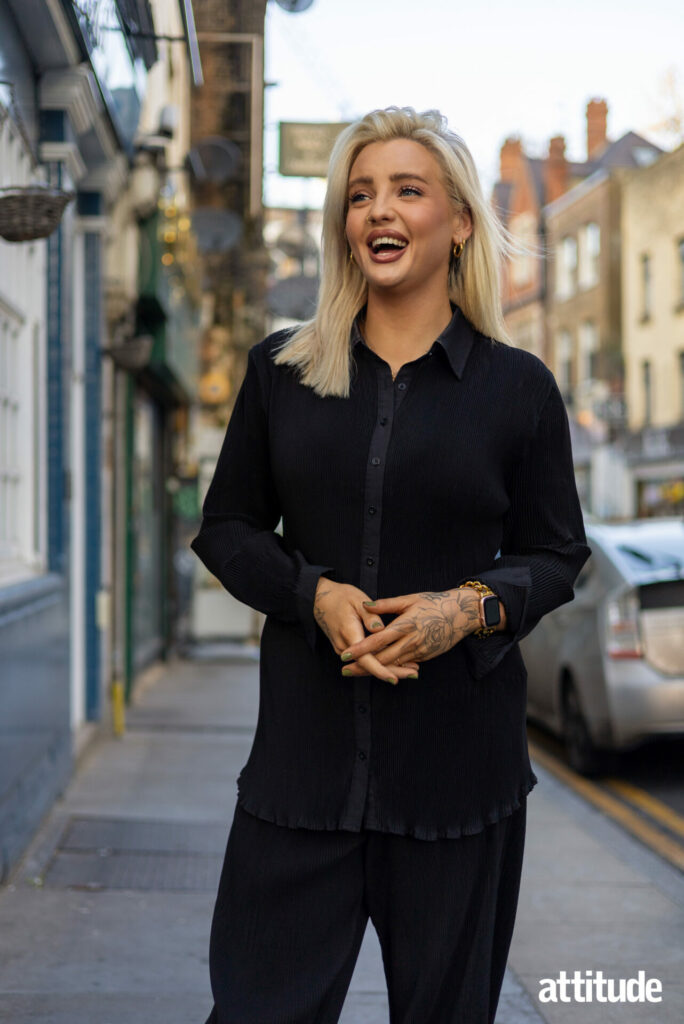Meet the inspiring founder of Not A Phase – a charity supporting trans and gender-diverse adults
“We now operate in eight locations across the UK,” says Dani in our exclusive interview.

When Not A Phase, a charity to change the lives of trans and gender-diverse adults for the better, was founded in 2020, it was a time of immense upheaval and pressure for the queer community. According to a report by Galop, four out of five trans respondents said that they had been the victim of a transphobic hate crime. And a quarter of those said that the attack had been violent in nature.
“The irony is,” says Not A Phase founder Dani St James, the leader of this year’s Third Sector and Community in Attitude 101, empowered by Bentley, our list of 101 influential LGBTQs, “that back then we believed that the issues that we were talking about seemed like the peak of anti-trans sentiment in the media and by the people that were working to oppress us, when in reality, here we are three years later and I still don’t believe that we have reached that peak.”
The depressing reality is that since 2020, anti-trans sentiment in this country has continued to grow like a cancer — even infiltrating the wider queer sphere with the formation of hate groups like LGB Alliance, whose mission is to disassociate the LGB initialism from trans people altogether. As Dani points out, trans people make up less than 0.5 per cent of this country’s population, so why have issues like trans kids, trans athletes and single-sex spaces become such a dominant staple of politics and the media?
“The reality is that with topics of this nature, there is never going to be a solution that completely satisfies anyone,” says Dani, “but the thing that we know for certain is that we make zero progress in finding a middle ground when the government and media are still painting people from the trans community as nefarious predators as they did with gay people in the aftermath of the Aids pandemic.”

The representation of trans people has certainly increased in recent memory, with more authentic portrayals of the trans experience on our screens and in written material than ever before. But this surplus in representation manifests as a double-edged sword. Although it is positively affirming for trans people to finally see their experiences showcased, it has also weaponised these experiences and provided the opposition with a guidebook on who they can attack next with newfound articulation. Politicians from both sides have taken to using the lives of trans people as a new political football. This fearmongering has led to repetitive cuts to the already failing healthcare system, resulting in what Dani says is “a healthcare crisis”.
“In essence, the healthcare system in the UK has been privatised for trans people,” says Dani. “Today, if I were an adult in London and I was lucky enough to find a GP that was able to refer me to the GIC [Gender Identity Clinic] — even though in their four years of training they are given half a day’s information about gender-diverse patients — it’s estimated that I would be waiting five to six years until I would be seen for my first appointment, with further waiting times to receive treatment of 18 months to two years. These are the wait times that are estimated right now, but with nothing being done to change them, it’s likely that while waiting, the times would increase. We are at a point where, with an optimistic view, I would be waiting five-and-a-half to seven years to receive gender-affirming care.”
“Our government is currently using us as a topic with which to distract the general public from its failings.”
These waiting times are appalling and are only set to increase with the overt anti-trans sentiment this country has swiftly become famous for, the latest example being Rishi Sunak’s enactment of Section 35 to stop Scotland from making it easier to apply for and receive a Gender Recognition Certificate — something that literally only affects the way you get married, your pension and your death certificate. This one piece of affirming paper was such an issue for this government that they have enacted powers over Scotland that they haven’t ever used before. As Dani says, this intervention only serves to reveal just how transphobic the leaders of this country are.
“The claim that this certificate has any implication on access to single-sex spaces or an impact on sex-based rights is baseless, incorrect and fuelled in hatred,” says Dani. “Our government is currently using us as a topic with which to distract the general public from its failings. We are in one of the worst economic times that the UK has seen and yet our Tory government continues to focus on denying us of our humanity and access to the same provisions that everyone has access to.”

This bleak reality is why Not A Phase was founded, and why the work that Dani and her team do is so vital. Their simple mission? Joy. In two years, Not A Phase has quickly made a name for itself in the charity sector, through its various services and activations.
“We now operate in eight locations across the UK,” says Dani. “We have safe spaces for people to gain essential access to peer support, guidance and resources. We run fitness and wellness programmes in two — soon to be three — cities, and we have our transformation fund, which enables us to support initiatives and organisations all over the UK that are working towards a brighter future for the community.”
And this is just the beginning. Dani and Not A Phase demonstrate the power of a community that refuses to sink to the lows of those who are against them. By advocating purely for trans happiness, they are not only providing an important service, but also raising a vital interrogation of this country’s refusal to accept trans humanity. We can’t wait to see what they do next.
Attitude 101, empowered by Bentley – our list of our 101 most influential LGBTQ people – appears in full in issue 351 of Attitude, available to buy and download now.
The rest of the Attitude 101 Third Sector and Community list
Andrew Gurza, Disability awareness consultant
Lucia Blayke, Trans rights activist
Ashley Joiner, Founder of Queercircle
Jodie Harsh, DJ and producer
Mmapaseka “Steve” Letsike, Founder of Access Chapter 2
Dan Beaumont, Co-founder of Dalston Superstore
Moud Goba, Manager at Micro Rainbow and co-founder of UK Black Pride
Nadine Noor, Artist and creative producer
David Furnish, CEO of Rocket Entertainment Group and chairman of Elton John AIDS Foundation
